-
 Art of Wellness Acupuncture & Traditional Chinese Medicine (TCM)11704 Wilshire Blvd, Suite 295, Los Angeles, CA, 90025
Art of Wellness Acupuncture & Traditional Chinese Medicine (TCM)11704 Wilshire Blvd, Suite 295, Los Angeles, CA, 90025
myartofwellness@gmail.com310-451-5522 Office Hours
MonClosedTue7:30 am --4 pmWed7:30 am --4 pmThu7:30 am -- 4 pmFri7:30 am -- 4 pmSat7:30 am -- 4 pmSunClosedOur office opens from Tuesdays to Saturdays 7:30 am to 4 pm, will be closed on Memorial day, Independent day, Labor day, Thanksgiving day, Christmas and New year.
-
Recent Posts
- How to Treat Rosacea With Acupuncture and TCM
- How to Treat Perioral Dermatitis With Acupuncture and TCM
- Lymphatic Drainage With Acupuncture and TCM
- How to Treat Turf Toe With Acupuncture
- How to Treat Nerve Pain With Acupuncture and TCM
- How to Treat Watery Eyes With Acupuncture and TCM
- How to Treat Ovarian Cysts With Acupuncture and TCM
- How to Treat Dystonia With Acupuncture and TCM
- Can Acupuncture Help Bad Breath?
- How to Treat Atopy with Acupuncture and TCM
- Plantar Fasciosis Treatment With Acupuncture and TCM
- How to Protect Yourself When Air Quality Is Poor
- How to Treat Spinal Headache With Acupuncture and TCM
- How to Treat Sarcoidosis With Acupuncture and TCM
- How to Treat Flu With Acupuncture and TCM
- Chinese New Year 2025 Year of the Snake
- Sign up to receive news and updates and get my free report:“The Top 10 Reasons to Try Acupuncture”

July 2025 M T W T F S S 1 2 3 4 5 6 7 8 9 10 11 12 13 14 15 16 17 18 19 20 21 22 23 24 25 26 27 28 29 30 31
Stress
How To Treat Addison’s Disease With Acupuncture and TCM
By Qineng Tan, L.Ac,. Ph.D. and Xiaomei Cai, L.Ac., Ph.D.

Always tired? Craving salty foods? Thirsty all the time? Adrenal fatigue? Addison’s disease is a condition in which the adrenal glands do not produce enough cortisol. Acupuncture and TCM can help to balance the adrenal hormones and relieve adrenal insufficiency symptoms.
Addison’s, also known as adrenal insufficiency, happens because of damage to the adrenal glands. What do the adrenal glands do? The adrenals are small glands that are located just above the kidneys. They produce hormones, including cortisol and aldosterone. These hormones are important in metabolic functions, and are also a big part of our stress response.
Cortisol is released from the adrenal glands into the bloodstream, and it aids in the body’s use of macronutrients: protein, carbohydrates, and fats. Cortisol regulates blood pressure and blood sugar levels, and it also gives us an extra energy boost when we need it because of sudden and/or stressful circumstances.
In many cases, Addison’s disease is the result of an autoimmune disorder. In these cases, the immune system mistakenly attacks the adrenal cortex, the part of the adrenal glands that produce cortisol and aldosterone.
In some parts of the world, tuberculosis infection is still common, and tuberculosis can lead to damage of the adrenal glands.
Other infectious diseases like HIV/AIDS, or fungal infections like histoplasmosis, can cause adrenal damage.
People with other autoimmune diseases may be more susceptible to developing Addison disorder, too. For example, Addison’s disease can happen concurrently with:
- Dermatitis herpetiformis
- Graves disease
- Type 1 diabetes
- Pernicious anemia
- Hashimoto’s disease, thyroiditis
- Vitiligo
- Myasthenia gravis
Some people may develop Addison’s disease in addition to having hypothyroidism or diabetes.
Addison’s Disease Symptoms
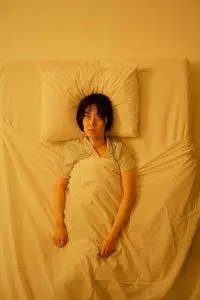
In the early stages, Addison’s disease symptoms may feel like a flu, causing fatigue, muscle weakness and joint pain. But as the illness progresses, these symptoms may become chronic.
Adrenal insufficiency symptoms include:
- Extreme fatigue
- Dehydration
- Loss of appetite
- Unexplained weight loss
- Darkening of skin in areas, hyperpigmentation, darkening of gums
- Blue-black color to skin around mouth, nipples, or genitals
- Low blood pressure, hypoglycemia
- Dizziness
- Fainting, light-headedness
- Craving salt
- Abdominal pain
- Nausea, vomiting
- Diarrhea
- Joint pain
- Muscle pain
- Depression
- Irritability
- Loss of body hair
- Sexual problems
- Irregular periods, no menstrual periods, missed periods
Primary ovarian insufficiency (POI), has been found to be more common among those with Addison’s disease, with about 1 in 10 women with Addison’s going through early menopause (before 40).
In extreme situations, Addison’s sickness can lead to kidney failure, or going into shock. Early warning signs of adrenal crisis include nausea, fever, headache, and confusion. This sudden worsening of Addison’s disease is known as Adrenal crisis, and requires immediate medical attention.
Medical Treatment for Addison’s Disease
Accurate diagnosis and appropriate treatment are crucial for individuals with Addison’s disease.
A doctor will typically diagnose Addison’s disease through blood tests. These tests measure the levels of cortisol and aldosterone in the blood. Low levels of these hormones are indicative of adrenal insufficiency.
If blood tests suggest adrenal insufficiency, an ACTH stimulation test may be performed. In this test, synthetic adrenocorticotropic hormone (ACTH) is administered, and cortisol levels in the blood are measured. Patients with Addison’s disease typically do not show a significant increase in cortisol after receiving ACTH.
The primary treatment for Addison’s disease involves hormone replacement therapy. Patients are prescribed synthetic cortisol (usually hydrocortisone or prednisone) to replace the insufficient natural cortisol production.
If aldosterone production is also insufficient, patients may be prescribed fludrocortisone to replace this hormone. This helps regulate salt and water balance in the body.
Dosage and frequency of cortisol replacement are adjusted to meet the specific needs of each patient. Patients often need to take multiple doses of medication daily to mimic the body’s natural cortisol rhythms.
These steroid medications can cause side effects like dizziness, nausea, and changes in the menstrual cycle.
Patients with Addison’s disease require ongoing medical supervision to monitor hormone levels, adjust medication as needed, and ensure that they are responding well to treatment.
Acupuncture offers an adjunct or alternative treatment for Addison’s disease that can help regulate hormones.
Can Acupuncture Help Addison’s Disease?
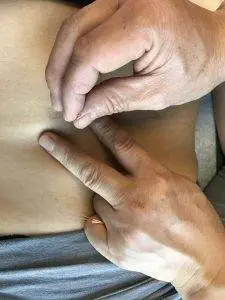
According to TCM theory, the kidneys are responsible for storing and controlling not only Qi, but “essence,” which represents a person’s foundational life force energy.
Addison’s disease, or adrenal insufficiency, is usually related to some variation of kidney deficiency according to TCM diagnosis.
Possible TCM diagnosis for Addison’s might be:
- kidney qi deficiency
- kidney yang deficiency
- kidney yin deficiency
- liver yin deficiency
- spleen blood deficiency
- spleen yang deficiency
By listening to a person’s range of symptoms, an acupuncturist will determine which pattern is emerging, and choose acupuncture points to bring energy and strength to the affected organs.
Moxibustion treatment is also an excellent modality to help build up Kidney Qi and blood.
Chinese herbs can help nourish and support kidney Qi.
For some people, acupuncture treatment and herbal supplements can be a good alternative treatment for Addison’s disease. For others, TCM treatment for adrenal insufficiency can be used as an adjunct to conventional treatment, and help to alleviate side effects of steroids, like dizziness, nausea, or menstrual changes.
Acupuncture Near Me for Addison’s Disease in West Los Angeles
Acupuncture can help address autoimmune diseases that are difficult for conventional medicine to treat. TCM modalities, including moxibustion and herbs, can provide a holistic treatment that works on the root level, restoring proper function of the immune system, as well as helping to relieve all kinds of symptoms.
Addison’s disease requires an individualized approach. Dr. Tan and Dr. Cai at Art of Wellness Acupuncture have over three decades of experience helping patients overcome all types of autoimmune disorders. Art of Wellness was recently named one of the top acupuncture practices in Los Angeles. Please do not hesitate to call us.
*This article is for education from the perspective of Traditional Chinese Medicine only. The education provided by this article is not approved by FDA to diagnose, prevent, treat and cure human diseases. It should not stop you from consulting with your physician for your medical conditions. Traditional Chinese Medicine is based on Qi, which is an invisible force that usually cannot be observed by modern science. Because science focuses on testing ideas about the natural world with evidence obtained through observation, these aspects of acupuncture can’t be studied by science. Therefore acupuncture and Chinese herbs are often not supported by double-blind, randomized trials, and they are considered alternative medicine therapies in the United States.
How To Treat Psoriasis With Acupuncture and TCM
By Xiaomei Cai, L.Ac., Ph.D. and Qineng Tan, L.Ac., Ph.D.
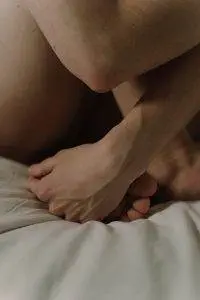
Rash, scaly skin, itchy skin? These could be signs of psoriasis, a chronic skin condition that causes skin to form in thick, scaly, discolored patches, especially on the elbows and knees. Acupuncture and TCM treatment can help relieve psoriasis and address the root causes of this autoimmune skin disease.
Autoimmune disorders stem from the body’s immune system malfunctioning. In the case of psoriasis, the body produces too many skin cells, forming thick scales, known as “plaques,” or a bumpy rash.
As with other conditions that involve skin rashes or other skin problems—like vitiligo, eczema, dermatitis, scleroderma, celiac disease, and lupus—psoriasis tends to flare up periodically, becoming worse for a few weeks or months at a time, and then improving. A psoriasis flare up happens because of widespread inflammation.
What Causes Psoriasis Flare Ups?
Getting a cut or burn on your skin can trigger a psoriasis flare up.
So can infections like a staph infection, strep infection, helicobacter pylori bacterial infection (which can also cause stomach ulcers), or chlamydia.
Viral infections like HIV and hepatitis C can trigger psoriasis. Fungal infections like candida, or yeast infections, can also trigger a psoriasis flare up.
Psoriasis affects millions of people, of all ages. Psoriasis rash can cause intense itching (pruritus), so much so that it can affect a person’s ability to concentrate in daily life and can also have a negative impact on sound sleep.
Medical research has not yet discovered exactly what causes psoriasis, but it may be partly due to genetics and partly due to environmental factors. It is not uncommon for a person to have psoriasis and also have another autoimmune condition, such as lupus, celiac disease, Crohn’s disease or inflammatory bowel disease (IBD), multiple sclerosis (MS), or autoimmune thyroid disease.
Acupuncture and TCM are excellent modalities for helping to relieve the symptoms of skin conditions like psoriasis and many autoimmune disorders. Acupuncture and herbs can help relieve itchy rashes and also help to improve the functioning of the immune system. Acupuncture treatment can also help with the emotional and psychological toll of dealing with psoriasis.
Top 5 Types of Psoriasis
Plaque psoriasis is by far the most common type of psoriasis, accounting for about 80% of cases. Other types of psoriasis are more rare and can be very serious.
- Plaque psoriasis or Psoriasis vulgaris – the most common type of psoriasis; thick scales that are red or pink with a silvery coating on them. These patches, or plaques, can itch intensely.
- Guttate psoriasis – small red or pink bumps that appear suddenly, covering the torso, arms, and/or legs. This condition sometimes clears up and does not return. In some cases, though, it can keep coming back, or later turn into plaque psoriasis. Guttate psoriasis may be triggered by infections, like strep throat.
- Pustular psoriasis – this is a rash of painful bumps that are filled with pus. Generalized pustular psoriasis is an extreme version of this condition, which can quickly cover the whole body and be accompanied by other symptoms like fever, headache, and muscle weakness. Generalized pustular psoriasis is a serious condition requiring medical care.
- Inverse psoriasis or Intertriginous psoriasis – develops in areas where skin folds upon itself, like armpits and around the genital area
- Erythrodermic psoriasis – usually develops as a more severe condition after a person has already been struggling with psoriasis. The skin becomes very red and appears to be burned. The person will feel very ill, with fever and chills and a rapid heart rate. Requires immediate medical attention.
Psoriasis is not only intensely uncomfortable, but the scaly skin can also have a significant impact on a person’s confidence in their appearance. These factors can mean that having psoriasis can have a negative effect on a person’s mental health and emotional health.
Acupuncture, when used as an adjunct therapy for psoriasis and other autoimmune conditions can help address anxiety, depression, and mood disorders, as well as helping with physical symptoms.
Medical Treatments for Psoriasis
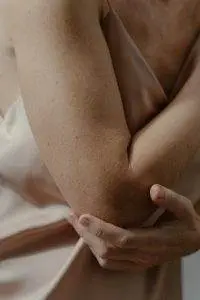
Conventional treatment for psoriasis aims to help slow down the overproduction of skin cells and relieve pain and itching.
Topical Medications for Psoriasis
Topical products are applied directly to the skin.
- Corticosteroids: Frequently prescribed for mild to moderate psoriasis, available in various forms like oils, creams, lotions, etc.
- Vitamin D Analogues: Synthetic forms of vitamin D that slow skin cell growth, used alone or with corticosteroids.
- Retinoids: Available as gel or cream, they reduce skin cell growth and may cause skin irritation and sensitivity to light.
- Calcineurin Inhibitors: Calm the rash and reduce scaly buildup, useful in areas of thin skin.
- Salicylic Acid: Reduces scaling of scalp psoriasis and prepares the scalp to absorb medication more easily.
- Coal Tar: Reduces scaling, itching, and inflammation, available in various forms like shampoo, soap, cream, and oil.
Oral or Injected Medications for Psoriasis
Systemic medications may work on the immune system or on skin cell production to help relieve psoriasis.
- Steroids: Injection of triamcinolone into small, persistent psoriasis patches.
- Retinoids: Pills to reduce skin cell production, not recommended during pregnancy.
- Biologics: Injected drugs that alter the immune system to improve symptoms in moderate to severe psoriasis.
- Methotrexate: Weekly oral dose to decrease skin cell production and suppress inflammation.
- Cyclosporine: Oral calcineurin inhibitor for severe psoriasis.
- Treatment approach based on needs and psoriasis severity.
- Start with milder treatments and move on to stronger ones if necessary.
- Pustular or erythrodermic psoriasis may require stronger systemic medications.
Phototherapy exposes the skin to ultraviolet light under a dermatologist’s supervision. UVB can help slow down cell production. Light therapy may use lamp units with bulbs, or a laser may be used to target very specific areas of affected skin.
Can Acupuncture Help Psoriasis?
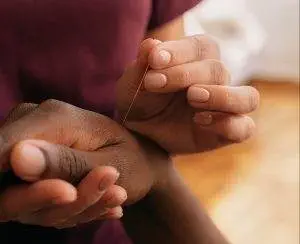
In TCM, elemental factors like heat, wind, dampness, dryness, and so on, are considered to act as pathogens, having a negative effect on bodily systems when they are either in excess or deficient.
According to TCM theory, the root causes of psoriasis may be related to pathogenic factors of excessive heat and dryness. Heat, as a pathogen, can cause redness and itchy skin. Wind can cause dryness of the blood. These conditions in combination can lead to stagnant blood and a fiery heat building up. TCM classifications for diagnosis related to psoriasis would include:
- Blood heat
- Blood stasis
- Blood dryness
- Blood deficiency
An individual, depending on their specific presentation of skin rash and other symptoms, may be diagnosed with a combination of these factors.
In Chinese medicine, the skin and the lungs are connected, with the skin being the outward presentation of what is going on in the lungs. So, acupuncture treatment for psoriasis may focus on strengthening lung Qi.
In other cases, the large intestine may be related; because of dryness, it may not be receiving enough fluid to be able to do the job of moving toxins out of the body.
In some cases, it may be that intense emotions are affecting the liver, causing blood stagnation due to stress. Liver Qi stagnation can cause overheating and for blood to “overflow” from vessels, causing red bumpy rashes.
Thus, herbal remedies and acupuncture treatment will often aim to clear heat, cool the blood, and improve circulation. Many herbs are helpful for this, as well as for helping to reduce inflammation and soothe dryness and itching.
Chinese medicine herbal preparations have been shown by modern scientific studies to inhibit immune-inflammatory reactions, regulate Th cells, and mediate the formation of skin lesions.
Review of scientific studies of TCM for psoriasis have shown that it can be effective for reducing the severity of skin lesions and help prevent recurrences of flare ups.
Acupuncture Near Me for Psoriasis in West Los Angeles
Psoriasis is a painful skin condition that requires special treatment. As an autoimmune condition, psoriasis needs to be addressed on a deeper level, as opposed to simply trying to relieve the itchy, scaly rash on the skin’s surface. TCM offers a holistic way of treating both skin diseases and autoimmune disorders that can bring deep relief. Consider seeking acupuncture as an adjunct treatment for psoriasis.
*This article is for education from the perspective of Traditional Chinese Medicine only. The education provided by this article is not approved by FDA to diagnose, prevent, treat and cure human diseases. It should not stop you from consulting with your physician for your medical conditions. Traditional Chinese Medicine is based on Qi, which is an invisible force that usually cannot be observed by modern science. Because science focuses on testing ideas about the natural world with evidence obtained through observation, these aspects of acupuncture can’t be studied by science. Therefore acupuncture and Chinese herbs are often not supported by double-blind, randomized trials, and they are considered alternative medicine therapies in the United States.
How to Treat Scleroderma With Acupuncture and TCM
By Xiaomei Cai, L.Ac., Ph.D. and Qineng Tan, L.Ac., Ph.D.
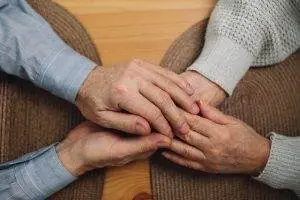
Hard, thickening, tight skin? Itchy, dry skin that is shiny? Changing skin color? These could be symptoms of scleroderma, an autoimmune disorder that causes your body to produce too much collagen. Acupuncture and TCM treatment can help relieve inflammation and pain while helping to resolve the underlying cause of scleroderma.
Scleroderma can be considered a type of dermatosis (skin lesion), and also a type of connective tissue disease (negatively impacting tissues that connect structures in the body), as it usually affects skin and cartilage, often starting in the extremities, and then extending up the limbs towards the trunk.
Collagen is a form of fibrous protein that the body produces to maintain the structure of skin cells, muscles, bones, and connective tissue. The immune system triggers collagen production when we are injured, but in the case of scleroderma, the body is overproducing and accumulating too much collagen.
Localized scleroderma affects primarily the skin tissue, but can also spread to subcutaneous tissues, like fascia and muscles.
In some cases, scleroderma can also impact internal organs, like the esophagus, lungs, heart, and kidneys. This is known as systemic scleroderma.
Top 3 Types of Scleroderma
Localized scleroderma can be differentiated into 3 types:
- Localized scleroderma – a few patches of discolored skin (circumscribed morphea); these skin lesions can vary in size, may be oval shaped, and are usually yellow in the center with a red border.
- Generalized scleroderma – also called generalized morphea, with this type there are more patches of thick, hard skin on various parts of the body, which may overlap.
- Linear scleroderma – more common in children, may show up as one band of affected skin on a limb or on the trunk, with a few patches of morphea. Linear scleroderma on arms and legs may affect the growth and development of that limb, as scleroderma may impact the muscle and bone tissues as well as the skin.
Systemic scleroderma is rare, but happens more commonly in women between the ages of 30 and 50. This type of scleroderma can manifest in different ways.
Systemic scleroderma can sometimes first show up as Raynaud’s phenomenon, or Raynaud’s syndrome, in which the blood vessels in the hands and feet close up when the weather is cold and cause color changes to the skin, as well as sensations of numbness, prickling, tingling, or pain. Stress can also trigger Raynaud’s.
Systemic scleroderma can cause scarring on the skin and internal organs, which can lead to gastrointestinal problems like acid reflux, cardiovascular and pulmonary problems, or renal disease.
Acupuncture treatment can be used as an adjunct treatment to help relieve symptoms of pain related to skin hardening, as well as helping to alleviate heartburn and GERD type symptoms in patients with esophageal symptoms of scleroderma. TCM can also help address the root causes of scleroderma and other autoimmune disorders.
What Causes Scleroderma?
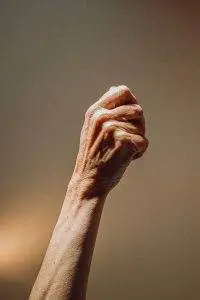
As with most autoimmune disorders, medical science has not yet discovered exactly why some people develop this condition. While it is not passed from parent to child the way genetic diseases are, you are more likely to have scleroderma if someone else in your immediate family has it, too.
It is believed that factors like environmental toxins and/or viral infections can trigger scleroderma symptoms to flare up. The overproduction of collagen is due to abnormal functioning of the immune system.
Because women develop scleroderma more often than men do, it may be that there is a hormonal factor that affects the disease, as well.
Diagnosis and Medical Treatment for Scleroderma
There is no cure for scleroderma, so conventional medical treatments aim to alleviate symptoms and slow down the progression of the disease. The treatment plan may vary depending on the specific manifestations and severity of the disease.
To diagnose scleroderma, doctors rely on a combination of clinical assessments, medical history review, physical examinations, and lab tests. A doctor will first observe skin changes, such as thickening and hardening, then look for internal organ involvement and other symptoms.
Blood tests can help identify specific antibodies associated with scleroderma, such as antinuclear antibodies (ANA), anti-centromere antibodies (ACA), and anti-Scl-70 (anti-topoisomerase I) antibodies. Additionally, blood tests can assess organ function, including kidney and liver function, as well as inflammatory markers.
X-rays, ultrasound, or CT scans may be used to evaluate internal organ involvement, such as lung fibrosis, gastrointestinal complications, and cardiac abnormalities.
A skin biopsy sample may be taken to confirm the presence of fibrosis and assess the degree of inflammation.

Medications that may be recommended for treating scleroderma symptoms include:
- Immunosuppressants: Medications such as methotrexate, mycophenolate mofetil, and azathioprine may be prescribed to suppress the immune response and reduce inflammation.
- Corticosteroids: Oral or topical corticosteroids can help manage inflammation and alleviate symptoms in certain cases. However, long-term use may have potential side effects and is usually minimized.
- Vasodilators: Medications like calcium channel blockers and prostacyclin analogs may be prescribed to improve blood flow and manage Raynaud’s phenomenon.
- Proton pump inhibitors (PPIs): These medications can help manage gastroesophageal reflux disease (GERD) symptoms, which are common in scleroderma patients.
Patients are often advised to make lifestyle changes to manage their condition effectively. These may include:using skin moisturizers and avoiding excessive sun exposure, and using sunscreen with a high SPF, avoiding cold temperatures and stress to prevent triggering Raynaud’s, quitting smoking, and eating an anti-inflammatory diet.
Can Acupuncture Help Scleroderma?
TCM treatment for scleroderma focuses more on addressing the underlying causes of the condition, rather than simply trying to relieve symptoms. An acupuncturist will look closely at the whole person, listen carefully to hear all the symptoms they are experiencing, even those which may seem unrelated, feel their pulse and make other observations, and then ascertain which diagnostic pattern may apply.
According to TCM theory, scleroderma symptoms may occur due to:
- Blood stagnation
- Yang deficiency
- Kidney Qi deficiency or yang deficiency
- Liver and Gallbladder damp heat
- Liver blood deficiency
- Liver win
- Spleen yang deficiency
- Stagnation of cold, wind, and/or damp
Depending on the diagnosis, the TCM practitioner will then plan a treatment protocol to address the root cause, using acupuncture and herbs. For example, herbs can help move stagnant blood, relieving the skin conditions related to scleroderma. Herbs can even help to inhibit collagen production, to help reduce skin hardening.
Acupuncture has been shown to help reduce the number of Raynaud’s attacks.
Moxibustion treatment may also be used to help relieve symptoms related to Raynaud’s phenomenon.
The use of acupuncture for stress relief is also integral to treatment for scleroderma, as stress can trigger a worsening of symptoms.
Acupuncture can help reduce esophageal reflux in cases where esophageal strictures have developed due to scleroderma in the digestive tract and help improve kidney function when kidneys have been impacted by fibrosis.
TCM herbal formulations for scleroderma will be individualized for each patient’s needs. Herbs may be used to help warm and nourish the organs, while clearing dampness and activating stagnant blood and Qi.
Acupuncture Near Me for Scleroderma in Los Angeles
Acupuncture and TCM herbal medicine can be excellent modalities for helping with difficult to treat skin conditions, connective tissue disorders, and autoimmune disorders, including:
- Dermatitis
- Eczema
- Psoriasis
- Vitiligo
- Rheumatoid Arthritis
- Lupus
- Herpes simplex
- Hives, urticaria
- Ehlers-Danlos syndrome (EDS)
If you are experiencing painful skin problems or digestive problems, consider seeking out alternative care in addition to conventional treatments.
*This article is for education from the perspective of Traditional Chinese Medicine only. The education provided by this article is not approved by FDA to diagnose, prevent, treat and cure human diseases. It should not stop you from consulting with your physician for your medical conditions. Traditional Chinese Medicine is based on Qi, which is an invisible force that usually cannot be observed by modern science. Because science focuses on testing ideas about the natural world with evidence obtained through observation, these aspects of acupuncture can’t be studied by science. Therefore acupuncture and Chinese herbs are often not supported by double-blind, randomized trials, and they are considered alternative medicine therapies in the United States.
How to Treat CRPS With Acupuncture and TCM
By Qineng Tan, L.Ac., Ph.D. and Xiaomei Cai, L.Ac., Ph.D.

Chronic pain, changes in skin temperature, and swelling in a specific limb or body part? Pain, swollen limbs, edema and inflammation after a seemingly minor injury? These could be signs of a condition known as Complex Regional Pain Syndrome (CRPS). Acupuncture and TCM can help relieve chronic pain due to CRPS.
CRPS is a relatively rare condition that usually causes pain and inflammation in an arm or leg. It most often occurs after someone experiences an injury to a limb, or has surgery on one of their limbs. The painful area may be swollen, turn red and hot sometimes, and blue and cold at other times.
CRPS is marked by pain that seems disproportionate to the injury or outside stimulus. For example, a person with CRPS may feel severe pain when the affected area is touched lightly, or when a breeze blows. While CRPS is not fully understood by medical science, it is generally considered to be a neurological disorder.
While most cases of CRPS do improve in the long run, there may be a long period of time during which the injured area seems to be getting more inflamed.
CRPS pain may worsen and spread to involve more of the affected limb. In some cases, the pain may even be “mirrored” in the opposite limb. This is partially why CRPS is theorized to be caused by problems with the nervous system.
Sometimes CRPS manifests without any evidence of nerve damage. This condition is known as CRPS-I, or Reflex Sympathetic Dystrophy Syndrome. (RSD or RSDS).
Some cases of CRPS can be associated with proven nerve damage; this is called “causalgia,” or CRPS-II.
Conventional Western medicine approaches primarily focus on managing symptoms with pain medications and physical therapy. In some cases, CRPS pain can be so severe that it causes disability, as the person cannot use their limb normally in daily activities.
Traditional Chinese Medicine (TCM) and acupuncture can help address the root causes of CRPS. Acupuncture and TCM offer a holistic approach to relieve pain and enhance overall well-being.
Top 5 Symptoms of Complex Regional Pain Syndrome (CRPS)

CRPS symptoms can change. A CRPS flare up may last days or weeks, when pain and swelling get worse. Sometimes, the pain may seem to come out of nowhere; other times, it may be triggered by exertion, stress, or other factors.
- Intense and prolonged pain: Individuals with CRPS experience severe and persistent pain that may seem disproportionate to the initial injury or cause. There may be “pins and needles” or a burning sensation. Light contact with something may cause severe pain; this phenomenon is known as “allodynia.” Or something that would usually cause mild pain, like a pin prick, causes severed pain; this is called “hyperalgesia.”
- Changes in skin temperature and color: The affected area may become warmer or cooler compared to the surrounding areas, and skin may appear blotchy, pale, red, or blue or gray.
- Swelling and sensitivity: Swelling, edema, and increased sensitivity to touch or even a slight breeze are common symptoms of CRPS.
- Limited range of motion: Stiffness, muscle weakness, and difficulty moving the affected limb or body part may occur. There may be tremors or jerky motions of the limb.
- Changes in skin texture, hair and nail growth: Abnormal hair and nail growth patterns, such as excessive hair growth or brittle nails, may develop in the affected area. The skin may become thinner or thicker, or may be shiny or scaly.
CRPS may cause unusually heavy sweating in the affected area, or cause there to be a total absence of sweating in the area.
Medical Treatment for CRPS
In the realm of conventional medicine, Complex Regional Pain Syndrome (CRPS) is understood as a multifaceted condition that often arises following an injury or trauma to a limb or body part. While the exact cause of CRPS is not fully understood, it is believed to involve abnormal responses of the central and peripheral nervous systems. Nerve damage, inflammation, and changes in blood flow are thought to play a role in the development of CRPS.
Certain risk factors may increase an individual’s susceptibility to the condition, such as a history of fractures, surgery, or repetitive motion injuries. Additionally, psychological factors and genetic predisposition may contribute to the development of CRPS.
CRPS can be triggered by a variety of factors, including surgery, immobilization, infections, emotional stress and trauma.
Diagnostic testing for CRPS may include a bone scan, x-rays, MRI, and a sweat production test.
Medications recommended may include pain relievers, corticosteroids to help bring down inflammation, and nerve blocking injections. Low doses of ketamine are sometimes used to help relieve pain. Topical analgesics may help reduce sensitivity in the affected area, as may heat therapy.
Other therapies for CRPS may include biofeedback and transcutaneous electrical nerve stimulation (TENS). Mirror therapy, in which a person stands or sits in front of a mirror set-up that tricks the brain into thinking it sees the injured limb working the way the healthy limb does, can be helpful for retraining the nervous system.
Acupuncture treatment for CRPS can work on multiple levels to help relieve pain, improve motor function, reduce inflammation, help heal nerves, and reduce stress.
Can Acupuncture Help CRPS?
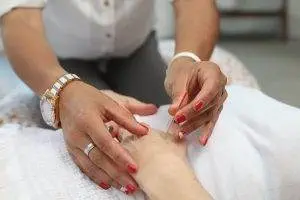
In Traditional Chinese Medicine (TCM), Complex Regional Pain Syndrome (CRPS) is understood as a disruption in the flow of Qi (energy) and Blood in the affected area, leading to pain and dysfunction. According to TCM theory, the underlying causes of CRPS are often related to the stagnation of Qi and Blood, as well as the blockage of meridians (energy channels) that run through the affected limb or body part. TCM treatments aim to restore the smooth flow of Qi and Blood, harmonize the body’s internal balance, and alleviate pain.
Acupuncture, a key component of TCM, is believed to stimulate specific acupoints along the meridians, helping to regulate the nervous system’s response and promote healing. Chinese herbal medicine is also commonly used in TCM to support the treatment of CRPS by addressing underlying imbalances and promoting overall well being. By addressing both the physical and energetic aspects of the condition, TCM aims to restore harmony and alleviate pain in individuals with CRPS.
One study looked at two soldiers whose upper extremities were injured in combat and were later diagnosed with CRPS. When conventional methods did not help relieve pain, they were given one or two acupuncture treatments per week for a few weeks. They had 80% improvement in pain and functionality and with no recurrence at a 20-month follow up.
An individual case study of a 34-year-old with CRPS showed improvement in pain and emotional well-being after a series of acupuncture treatments.
When dealing with Complex Regional Pain Syndrome (CRPS), incorporating certain lifestyle changes, behavioral adjustments, dietary modifications, and home remedies can be beneficial in managing the condition. Here are some recommendations:
Stress Management: Practicing stress-reducing techniques such as deep breathing exercises, meditation, and mindfulness can help alleviate CRPS symptoms. Stress management techniques promote relaxation and can positively impact pain perception.
- Gentle Exercise: Engaging in low-impact exercises like walking, swimming, or yoga can help improve blood circulation, maintain joint flexibility, and reduce muscle stiffness. It is important to consult with a healthcare professional or physical therapist to determine the most appropriate exercise program for your specific situation.
- Heat and Cold Therapy: Applying heat packs or cold compresses to the affected area may provide temporary relief from pain and inflammation. Experiment with both methods to see which works best for you. Remember to protect your skin and avoid extreme temperatures.
- Balanced Diet: Maintaining a healthy and well-balanced diet is crucial for overall well-being. Include nutrient-rich foods such as fruits, vegetables, whole grains, lean proteins, and healthy fats. Avoid excessive consumption of processed foods, refined sugars, and caffeine, as they may contribute to inflammation and worsen symptoms.
- Adequate Hydration: Staying hydrated is important for promoting optimal bodily function and supporting overall health. Aim to drink an adequate amount of water throughout the day to keep your body hydrated and support proper circulation.
- Stress Reduction: CRPS symptoms can be exacerbated by stress. Engaging in activities that promote relaxation, such as hobbies, listening to soothing music, spending time in nature, or engaging in creative outlets, can help reduce stress levels and improve overall well-being.
- Sleep Hygiene: Getting sufficient and quality sleep is essential for managing chronic pain conditions. Establish a regular sleep routine, create a comfortable sleep environment, and practice good sleep hygiene habits like avoiding electronic devices before bed.
It’s important to note that these lifestyle changes, behavioral adjustments, dietary modifications, and home remedies should complement your comprehensive treatment plan and be tailored to your individual needs. Consult with a healthcare professional or a qualified practitioner of Traditional Chinese Medicine (TCM) for personalized guidance and recommendations based on your specific condition and symptoms.
Acupuncture Near Me for CRPS in Los Angeles and Santa Monica
At Art of Wellness Acupuncture in West L.A., we have over 35 years of experience treating neurological conditions and chronic pain of all kinds. Acupuncture is a modality that is particularly suited to treating conditions like CRPS, where it may be difficult to find relief through conventional treatment methods. If you are experiencing excessive pain in one of your limbs, with temperature sensitivity and inflammation, it may be worth seeking out alternative treatment with TCM.
*This article is for education from the perspective of Traditional Chinese Medicine only. The education provided by this article is not approved by FDA to diagnose, prevent, treat and cure human diseases. It should not stop you from consulting with your physician for your medical conditions. Traditional Chinese Medicine is based on Qi, which is an invisible force that usually cannot be observed by modern science. Because science focuses on testing ideas about the natural world with evidence obtained through observation, these aspects of acupuncture can’t be studied by science. Therefore acupuncture and Chinese herbs are often not supported by double-blind, randomized trials, and they are considered alternative medicine therapies in the United States.
How to Treat Stomach Ulcer With Acupuncture and TCM
By Qineng Tan, L.Ac., Ph.D. and Xiaomei Cai, L.Ac, Ph.D.
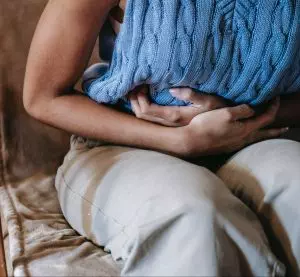
Burning sensation in your stomach? Persistent abdominal pain? Frequent heartburn and indigestion? These could be stomach ulcer symptoms. Acupuncture and TCM can help alleviate ulcer symptoms and reduce inflammation.
Stomach ulcers, also known as peptic ulcers, are painful sores that develop in the lining of the stomach or the upper part of the small intestine. Acid that is naturally present in the digestive tract begins to eat away at the lining of the stomach or intestinal walls. This can cause discomfort, burning pain, and other symptoms that significantly impact a person’s quality of life.
Peptic ulcers may lead to complications if left untreated. In these cases, we may refer to the condition as peptic ulcer disease (PUD).
If the ulcer is near a blood vessel, it can cause internal bleeding. In severe cases, an ulcer can burn through the wall of the stomach, which leads to undigested food and digestive juice leaking out into the abdominal cavity. This is known as a “perforated ulcer” and often requires immediate surgery.
A peptic ulcer can also be so inflamed that it blocks food from moving through the digestive tract, which can cause you to feel full quickly, regurgitate food, and lose weight unintentionally. This is known as “obstruction.”
Ulcers are typically treated with medications and, in more severe cases, surgery. Acupuncture treatment can be used as an alternative or adjunct treatment to help heal ulcers, with or without surgery.
What Causes Stomach Ulcers?
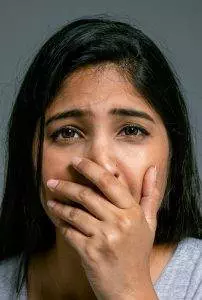
Stomach ulcers are often caused by an imbalance between the digestive fluids and the protective mechanisms of the stomach lining. There is usually a lining of mucus that helps protect the stomach from digestive fluids, but sometimes there is too little mucus and too much acid.
A bacterial infection with the Helicobacter pylori bacteria is often involved in the formation of an ulcer. This bacteria can cause inflammation that affects the stomach lining. Left untreated, an H. pylori infection in the digestive tract can increase your risk for certain types of gastric cancers.
Canker sores, also known as mouth ulcers or aphthous ulcers, can also be caused by the H. pylori bacterial infection. Canker sores can also be related to other gastrointestinal disorders, like Crohn’s disease, or inflammatory bowel disease (colitis).
A rare condition called Zollinger-Ellison Syndrome (ZES), in which a tumor called a gastrinoma develops in the pancreas or top part of the small intestine, can cause excessive amounts of stomach acids to be produced, which can lead to the formation of ulcers.
Long-term use of nonsteroidal anti-inflammatory drugs or pain medication (NSAIDs), like Ibuprofen can also cause inflammation in the stomach.
Lifestyle habits like smoking, drinking too much alcohol, or eating a lot of spicy foods irritate the stomach lining and contribute to the development of ulcers.
Emotional and/or physiological stress can throw off the body’s pH balance, which can also cause excessive stomach acids to be produced.
Top 5 Symptoms of Stomach Ulcers
While it is possible to have an ulcer and not be aware of it because you don’t have any symptoms, most people with ulcers will experience some pain in their stomach.
- Abdominal pain: A burning or gnawing pain in the abdomen, typically between the breastbone and the navel. The pain may be worse when the stomach is empty, such as between meals, and at night.
- Indigestion: Discomfort or bloating after eating, belching, and heartburn (acid reflux).
- Nausea and vomiting: Feeling nauseous and experiencing vomiting, especially after meals. Some people may even vomit blood.
- Loss of appetite: A decreased desire to eat due to feelings of fullness or discomfort.
- Blood in the stool: In severe cases, ulcers can lead to bleeding, resulting in blood in the stool or black, tarry stools.
Other ulcer symptoms can include: changes in appetite, intolerance to certain foods, especially fatty foods, feeling faint, having trouble breathing, and weight loss.
People may feel that the stomach pain is alleviated by eating certain foods that create a buffer against the stomach acid.
While medications and lifestyle changes are commonly used to treat peptic ulcer symptoms, acupuncture and Traditional Chinese Medicine (TCM) offer a holistic approach to address the root causes and alleviate symptoms of stomach ulcers.
Medical Treatment for Peptic Ulcers
When you seek conventional treatment for stomach ulcers, an endoscopy may be performed so that your doctor can see the ulcer(s) and possibly stop bleeding or remove abnormal tissue. Medications may be offered, and in some cases, surgery may be indicated.
Medications for stomach ulcer treatment include:
- Proton pump inhibitors (PPIs): These drugs reduce stomach acid production, allowing the ulcer to heal. PPIs include omeprazole, lansoprazole, and esomeprazole.
- Histamine receptor blockers (H2 blockers): These medications reduce acid production, providing relief and promoting ulcer healing. Famotidine and ranitidine are common H2 blockers.
- Antibiotics: If an H. pylori infection is present, a combination of antibiotics, such as amoxicillin and clarithromycin, will be prescribed to get rid of the bacteria.
Stomach ulcer surgery may be necessary if complications like perforation or obstruction occur.
Repairs to a stomach ulcer can be performed during an endoscopic procedure, where a camera and tools are introduced through the throat.
Minimally invasive laparoscopic surgery can be done through a small incision in the abdomen. Holes in the stomach may be patched with something called a Graham Patch.
If the hole is too large to be patched, then a small part of the stomach may be cut away, and the whole stomach will be closed, and, if necessary, reconnected to the top of the small intestine. This procedure is called a partial gastrectomy.
While conventional medical intervention for stomach ulcers can help bring relief, they do not necessarily prevent the recurrence of ulcers. Medications and surgery do not address the chronic stress that may have contributed to the formation of the ulcers in the first place.
Acupuncture treatment can help restore balance of the emotions as well as gastric fluids. It can also promote healing after ulcer surgery and prevent further occurrence of ulcers. If an ulcer is not yet so severe that surgery is needed, acupuncture treatment may be able to help heal the ulcer before it becomes worse.
Can Acupuncture Help Stomach Ulcers?
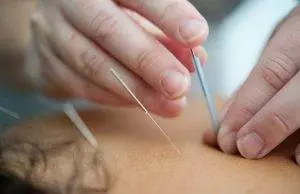
Acupuncture treatment for stomach ulcers, gastric pain, and also canker sores (mouth ulcers), is usually focused on harmonizing the Qi (life force energy) of the stomach and the spleen. Heat and dampness are pathogenic forces that can cause imbalance in the stomach and spleen, while heat and wind in the lungs can also be a factor, from the TCM theory perspective.
Therefore, acupuncture points will be chosen to help strengthen and regulate the stomach and spleen. Acupuncture has been shown to have an effect on the vagus nerve and help reduce overactive acid production in the stomach. Acupuncture also affects the central nervous system, with the effect of reducing pain sensations.
One study compared patients who received acupuncture treatment for peptic ulcers in addition to medication (bismuth subnitrate and amoxicillin) versus patients who received only medications. The patient who also had acupuncture had a higher recovery rate, clearing the H. pylori bacterial infections, and also had a dramatically reduced recurrence rate in the following year after treatment ended.
A laboratory study showed that acupuncture helped to repair ulcerated tissues, reduce the secretion of gastric acids, and improve the condition of gastric mucosa, or stomach lining.
Another study showed that acupuncture treatment for chronic gastritis—inflammation of the stomach lining—was more effective than a drug protocol consisting of proton pump inhibitors, NSAIDs, and antibiotics.
Acupuncture Near Me for Stomach Ulcer – Los Angeles Area
At Art of Wellness Acupuncture and Traditional Chinese Medicine in West L.A., we have over 35 years of experience helping people with gastrointestinal disorders of all kinds. Problems such as nausea, diarrhea, constipation, diverticulitis, colitis (IBD), IBS, and Crohn’s disease can all be relieved by using TCM as an alternative or complementary medicine treatment.
*This article is for education from the perspective of Traditional Chinese Medicine only. The education provided by this article is not approved by FDA to diagnose, prevent, treat and cure human diseases. It should not stop you from consulting with your physician for your medical conditions. Traditional Chinese Medicine is based on Qi, which is an invisible force that usually cannot be observed by modern science. Because science focuses on testing ideas about the natural world with evidence obtained through observation, these aspects of acupuncture can’t be studied by science. Therefore acupuncture and Chinese herbs are often not supported by double-blind, randomized trials, and they are considered alternative medicine therapies in the United States.